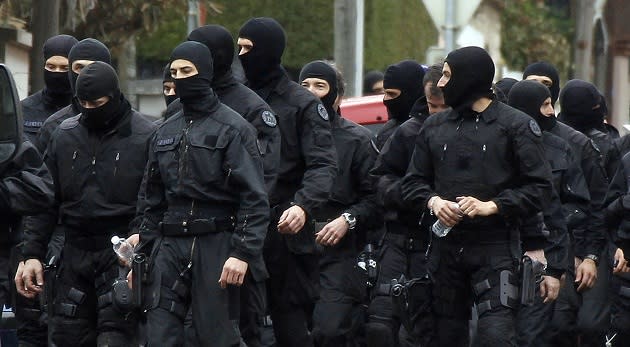 The Envoy
The EnvoyFrench officials face questions over handling of Toulouse terror suspect

French president Nicolas Sarkozy called for unity in France Thursday following the dramatic shootout that killed Toulouse gunman Mohamed Merah after a 32-hour standoff. Merah, a 23-year-old Frenchman of Algerian descent, had admitted Wednesday to negotiators that he had killed three children and their teacher and three French paratroopers, prosecutors said. And indeed, they said they found videotapes he had made of the killings in his apartment.
But French officials were facing sharp questions in the wake of the Toulouse killing spree, in particular about why they had failed to close in on Merah earlier.
The 23-year-old Toulouse trained mechanic had traveled to Afghanistan and Pakistan at least twice, most recently in 2011. He claimed to have trained in jihadi camps in Waziristan, according to French prosecutors Thursday, who said he had also proclaimed allegiance to al-Qaida. Merah was also well-known to Toulouse law enforcement, having been charged for over a dozen petty crimes as a juvenile. He later served 18 months in prison from 2007-2009 for purse snatching. His attorney reportedly said this week that at their last meeting a couple months ago, he had advised Merah to be on his best behavior because he had recently returned from Afghanistan and would be on the police's radar. (Merah had been picked up for driving without a license.)
"That is one of the big questions people in France are asking coming out of this," Christophe Bauer, a producer at French broadcaster France 24, told Yahoo News Thursday. "There's a sense he just came back from Afghanistan. French officials said they had been tracking him. But what does that tracking mean? Apparently, the French intelligence services in Toulouse talked to him when he got back from Afghanistan."
CNN reported Thursday that Merah was on the U.S. "no-fly" list since 2010, related to his activities in Afghanistan.
Experts on jihadi movements say several factors would have put Merah on the radar of French law enforcement and intelligence. Among them, his multiple trips to Afghanistan and Pakistan, his history of past petty crimes and his alleged affiliation with an Islamist organization.
"The problem is trying to figure out who will go a step further," Aaron Zelin, a research associate at Brandeis University, who focuses on Islamic jihadi groups, told Yahoo News on Wednesday. As in any country, Zelin said, "it's hard to know when a person is totally radicalized."
It isn't clear what set Mareh off on his killing spree, which began ten days ago with the first of tw0 shooting incidents which killed three French paratroopers of North Africa descent, and wounded a fourth of Caribbean descent. On Monday, he killed three school children and their teacher at the Ozar Hatorah Jewish day school in Toulouse. Mareh allegedly told French negotiators that he carried out the killings to avenge the death of Palestinian children in Gaza and to protest French participation in the NATO-led peacekeeping force in Afghanistan.
There were other factors that might have made Merah's intentions harder to detect in advance of the killing spree, Zelin said. Most notably, Mareh used a gun rather than explosives for his attacks. Many past other recent jihadi-motivated attacks in Europe and the United States--such as the "7/7" 2005 attacks on the London underground and buses, and the attempted 2010 Times Square car bombing--have involved explosives or attempted bombings. "Most of the time, they try to put together a bomb," for which they need to acquire products, such as large amounts of fertilizer, that may "look shady" and tip off police to try to stop it, Zelin said.
Some French military analysts were also critical of the police raid Thursday for ultimately failing to take Merah into custody alive after the 32 hour standoff, as French officials repeatedly said they hoped to do.
"From a purely technical standpoint, this operation—which lasted 32 hours—is a failure," Jean-Dominique Merchet, a journalist who covers military affairs for French publication Marianne, wrote, according to a translation. "Counterterrorism specialists wonder why, when it was, they say, a fairly simple operation. Merah was alone and had no hostages."
Among their critiques, he said, when the elite French counterterrorism force (known by its acronym RAID) stormed the apartment, "it lacked one essential element: reliable information," Merchet wrote. Police were not even certain that Merah was alive when they stormed the apartment. Even then, when they battered in the door, Merah, entrenched in the bathroom, was able to shoot first at them. A five-minute shootout ensued, in which some 300 pieces of ammunition were fired, and even then Merah was apparently able to escape through the window before he was shot in the head by a police sniper, Merchet noted.
More popular Yahoo! News stories:
• France school shooting victims are buried in Israel
• Pentagon war game forecasts U.S. would be drawn into new war if Israel strikes Iran
• Defense lawyer asks if Sgt. Robert Bales should have been sent to Afghanistan with brain injury
Want more of our best national security stories? Visit The Envoy or connect with us on Facebook or on Twitter.
Want more of our best political stories? Visit The Ticket or connect with us on Facebook, follow us on Twitter, or add us on Tumblr. Handy with a camera? Join our Election 2012 Flickr group to submit your photos of the campaign in action.
